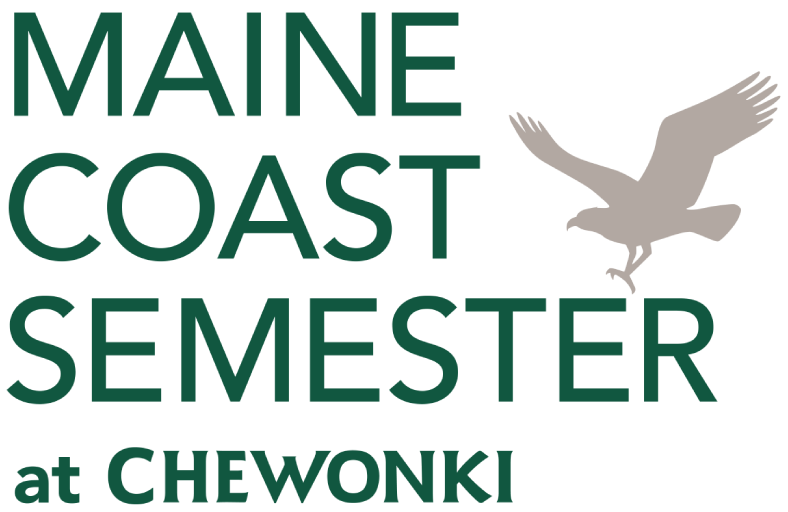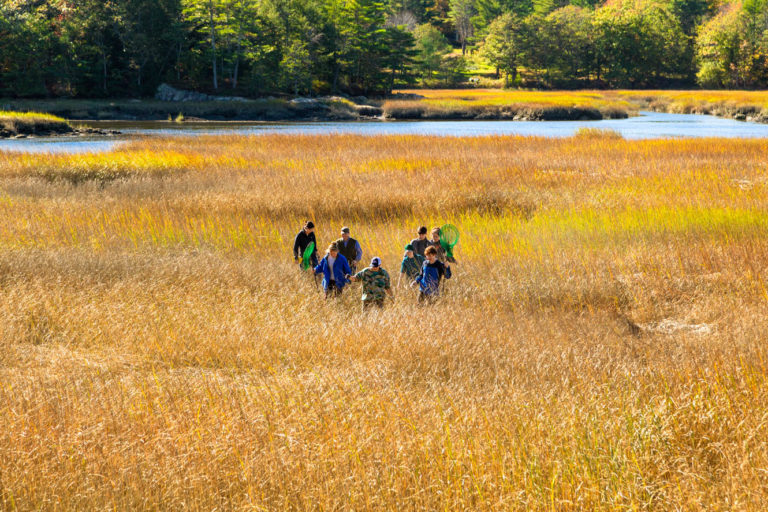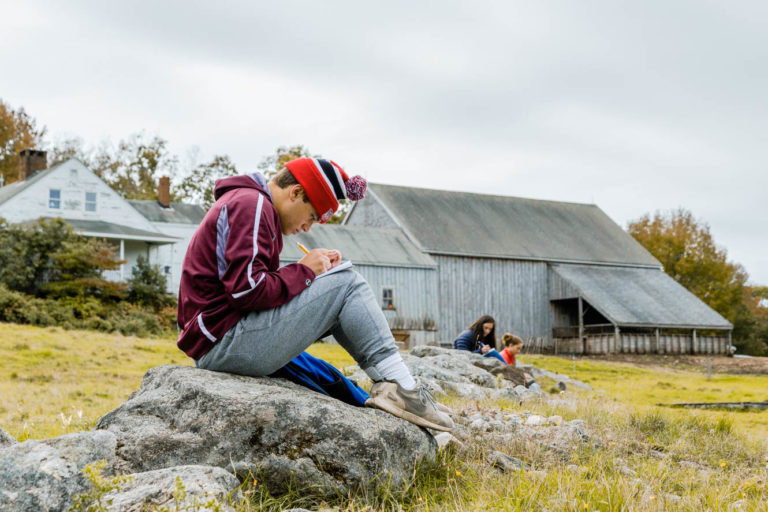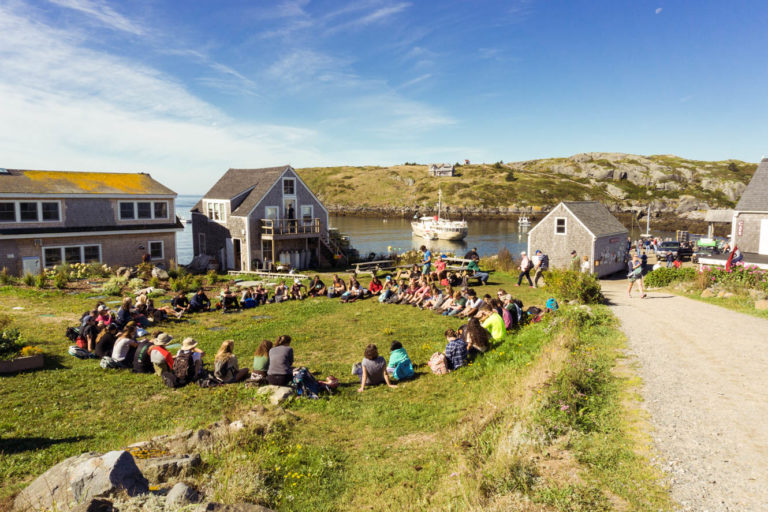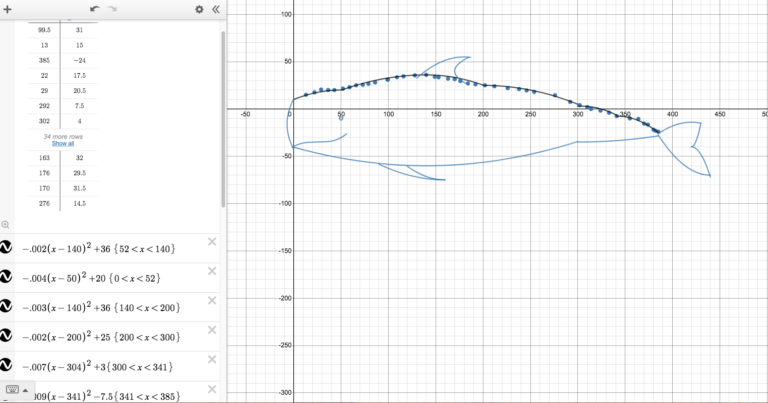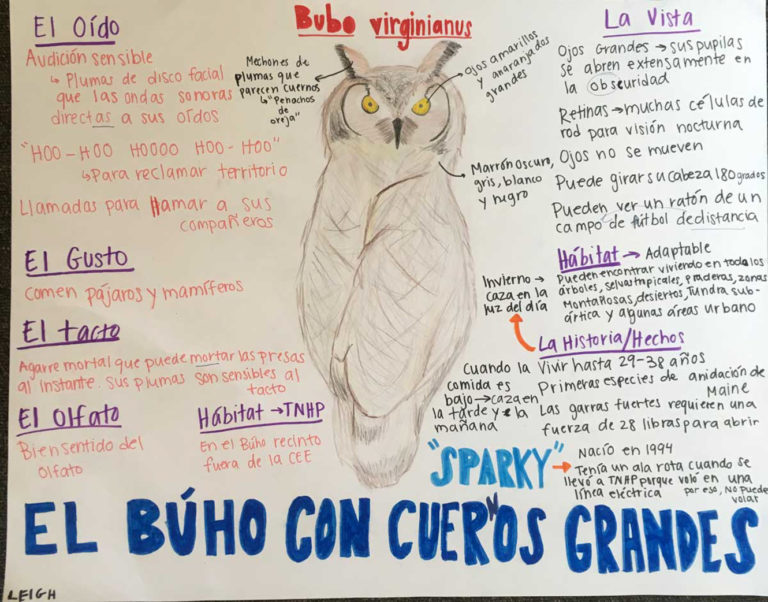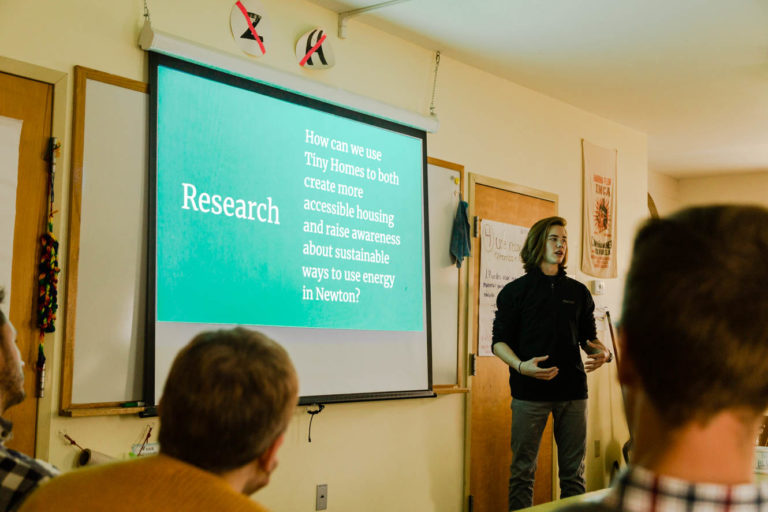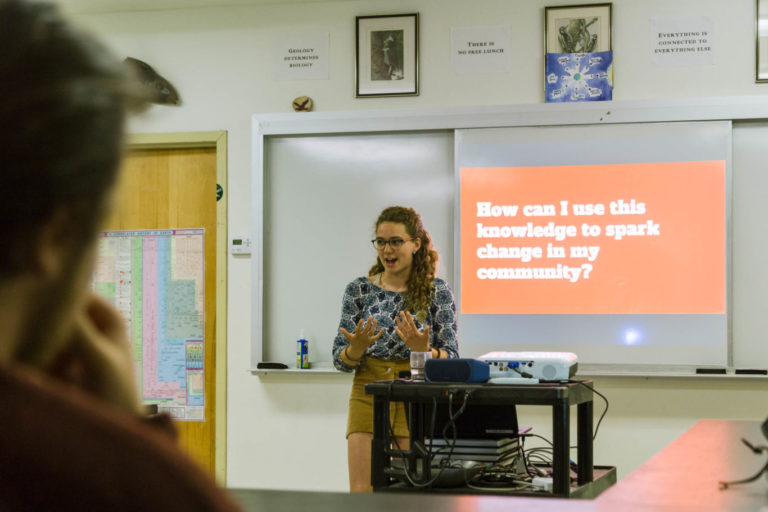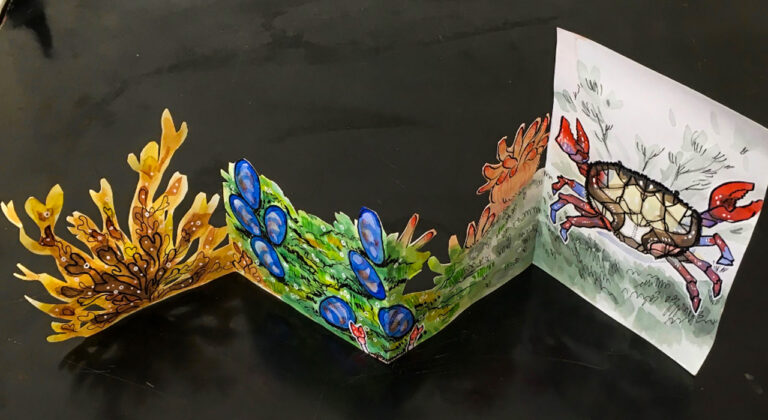World Languages at Maine Coast Semester
World language courses are offered at intermediate and advanced levels. The world language programs of our sending schools play a large part in the planning of the curricula. Information provided by the student’s sending school, as well as level of ability, helps to determine placement. Classes are designed to fully prepare students to re-enter their sending school language program when they leave Maine Coast Semester.
World language courses aim to provide quotidian, local, national and international contexts for language acquisition and application. Classes are conducted in the target language and take both a local and a global focus. Students learn vocabulary relevant to their experiences at Maine Coast Semester such as farm work or sustainable practices and use writing assignments to practice target language writing skills as they reflect on their experiences. Students learn about current events and issues from around the globe by reading articles or texts from a variety of sources and listening to current music. Due to small class sizes, the students have the opportunity to focus on speaking ability and their individual language needs.
Goals:
- To increase students’ understanding of grammatical structures and their ability to apply them through the study of literature, current events, music, oral exercises and listening comprehension.
- To inspire a love of language by exposing students to global cultures and promoting further exploration.
- To create a safe environment where students gain confidence with the language through immersion.
- To inspire interest in current events and issues in the nations in which their language of study is spoken.
Intermediate French (H)
Elective, Prerequisite: French I & II
French at Maine Coast semester is place-based and focuses on North American French. Students will learn of the historical roots of French in Maine by exploring the stories of French Canadian immigrants who came to work in mill towns in New England. A field trip to the Franco-Center in Lewiston, Maine happens every semester and provides students the opportunity to communicate with native French speakers. Students of Intermediate French are required to have a foundation in many of the grammatical aspects of the language before their arrival at Maine Coast Semester. All students should be proficient in their use of: présent, imparfait, passé composé, and futur proche. For the spring semester, students should have at least an introduction to the conditional mood. Students will engage with authentic course materials to support their study and mastery of key grammatical concepts. Classroom conversation and oral presentations are used to both build confidence in the spoken language and assess the progress of students. Additionally, this course uses the natural world, our day to day lives and the unique systems of Chewonki Neck to provide context for learning and relevant application of the language. Each semester incorporates units related to life at Chewonki, the five senses and natural observation, current events and the expression of thoughts and opinions, introduction to film and/or literary analysis.
Students of Intermediate French will:
- Grow in their abilities and confidence to communicate in the target language through writing and reading.
- Hone and refine the foundations of French and use them in context.
- Build awareness and investigate themes and topics relevant to the French speaking world.
Each semester, students engage with a variety of texts to support their learning. Short stories, songs, poetry, and news articles in French accompany students’ investigation of current events and culture and provide material to build reading comprehension in the target language.
Advanced French (H)
Elective, Prerequisite: Intermediate French
French at Maine Coast semester is place-based and focuses on North American French. Students will learn of the historical roots of French in Maine by exploring the stories of French Canadian immigrants who came to work in mill towns in New England. A field trip to the Franco-Center in Lewiston Maine happens every semester and provides students the opportunity to communicate with native French speakers. To be prepared for Advanced French at Maine Coast Semester, students are required to enter with a firm understanding of all verb tenses and a good grasp of most grammatical elements of the French language. Students should feel comfortable engaging in complex texts such as new articles, short stories, opinion pieces, and novels. This class is conducted entirely in target language, drawing on skills and proficiency of the students in class. Students of Advanced French will also have the opportunity to build leadership skills in the classroom, by facilitating and guiding student conversations around current events and other relevant themes. Possible units covered in this course include, but are not limited to: daily life on Chewonki Neck, food systems, and environmental issues, as well as Québec culture and history.
Students of Advanced French will:
- Build confidence and competency through daily classroom conversations and discussions around relevant texts.
- Develop critical analysis skills in the target language.
- Explore themes and topics relevant to the French-speaking world: locally and internationally.
Each semester students engage in a variety of texts from French language periodicals and editorial to poetry, short stories, songs, and other literature. Students will read the novel Ru by Kim Thuy.
Intermediate Spanish (H)
Elective, Prerequisite: Spanish I & II
Students of Intermediate Spanish are required to have a foundation in many of the grammatical aspects of the language before their arrival at Maine Coast Semester. All students should be proficient in their use of: the present simple, imperfect and preterite past tenses, superlatives and comparatives, direct and indirect object pronouns, “gustar-like” verbs and demonstrative adjectives. For the spring semester, students should have at least an introduction to the subjunctive mood. Students will engage with authentic course materials to support their study and mastery of key grammatical concepts. Classroom conversations, discussions, and oral presentations are used to both build confidence in the spoken language and to assess the progress of those students. Additionally, Intermediate Spanish uses the natural world, our day-to-day lives, and the unique systems and phenomena of Chewonki Neck to provide context for learning and relevant application of the language. Each semester incorporates units related to life at Chewonki, the five senses and natural observation, current events and the expression of thoughts and opinions, introduction to film and/or literary summaries and analysis.
Students of Intermediate Spanish will:
- Grow in their abilities and confidence to communicate in the target language through writing and reading.
- Hone and refine the foundations of Spanish grammar and use them in context.
- Build awareness and investigate themes and topics relevant to the Spanish-speaking world.
Each semester, students engage with a variety of texts to support their learning. Instructed writing is taught through personal essays to practice and acquire writing proficiency in Spanish. Short stories and news articles accompany students’ investigation of current events and culture and provide material to build reading comprehension in the target language. Some examples include Cajas de cartón by Francisco Jiménez and El Eclipse by Augusto Monterroso. Additionally, grammar exercises are pulled from a multitude of sources.
Advanced Spanish (H)
Elective, Prerequisite: Completion of Spanish III at sending school
To be prepared for Advanced Spanish at Maine Coast Semester, students are required to enter with a firm understanding and near mastery of the following grammatical elements: the present indicative and subjunctive, the imperfect and preterite past tenses, the use of indirect and direct object pronouns, the future tense, and the perfect tenses with an introduction to the conditional and imperfect subjunctive. Building on this knowledge, students will use authentic materials to explore themes and events relating to the Spanish-speaking world locally, nationally and internationally. Students enrolled in this advanced course will apply their Spanish to daily classroom conversations entirely in the target language. Grammar will be taught in context and incorporated in their writings, and feedback will be provided throughout their assignments. Students will also utilize the natural world and their daily lives to build unique vocabulary to Chewonki Neck. Each semester incorporates units relating to life on Chewonki Neck, current events, literary and/or film analysis, immigration in the United States and abroad, and social justice in Latin America.
Students of Advanced Spanish (H) will:
- Build confidence and competency through daily classroom conversations and discussions around relevant texts.
- Develop critical analysis skills in the target language.
- Explore themes and topics relevant to the Spanish-speaking world: locally and internationally.
Texts used: Each semester students engage in a variety of texts from Spanish language periodicals and editorial to poetry, short stories, and other literature. Some examples of text used include: Casa Tomada by Julio Cortazar; La Peste del Insomnio by Gabriel Garcia Marquez; El Eclipse by Augusto Monterroso; La United Fruit Co. by Pablo Neruda; and Cajas de cartón by Francisco Jiménez.
Advanced Spanish II (H)
Elective, Prerequisite: Completion of Spanish IV at sending school
Students of Advanced Spanish will arrive on campus with a thorough knowledge of most if not all the grammatical elements of the Spanish language. Students should feel comfortable engaging in complex texts such as new articles, short stories, opinion pieces, and short novels. This class is conducted entirely in the target language, drawing on the skills and proficiency of the students in class. This Advanced Spanish-II course is taught as a college-level seminar emphasizing discussion, debate, and critical analysis. Students will also have the opportunity to build leadership skills in the classroom, by facilitating and guiding student conversations around current events and other relevant themes. Possible units covered in this course include, but are not limited to: daily life on Chewonki Neck, immigration in the United States and abroad, food systems and environmental issues, social justice and social movements, as well as film and literary analysis. Students will develop their skills in the four core areas of language acquisition: reading, writing, listening, and speaking focusing on objective, persuasive and analytical language.
Students in this Advanced Spanish–II (H) course will:
- Build confidence and competency through daily classroom conversations and discussions around relevant texts.
- Develop critical analysis skills in the target language.
- Explore themes and topics relevant to the Spanish-speaking world: locally and internationally.
Texts used: Each semester students engage with a variety of texts from Spanish-language periodicals and editorials to poetry, short stories, and other literature. Some examples include: Exodo by Mariano García Bermúdez; La Eclipse by Augusto Monterroso; La Casa de los Espíritus by Isabel Allende and La United Fruit Co. by Pablo Neruda.
A Note on World Language Levels:
Final determination of language class levels is based on results of the student’s placement test and/or the sending school language teacher’s placement recommendations.
